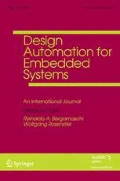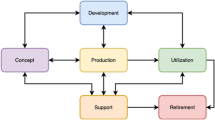Abstract
One notable advantage of Model-Driven Architecture (MDA) method is that software developers could do sufficient analysis and tests on software models in the design phase, which helps construct high confidence on the expected software behaviors and performance, especially for safety-critical real-time software. Most existing literature of reliability analysis ignores the effects from those deadline requirements of tasks which are critical properties for real-time software and thus cannot be ignored.
Considering the contradictory relationship between the deadline requirements and time costs of fault tolerance in real-time tasks, in this paper, we present a novel reliability model, which takes schedulability as one of the major factors affecting the reliability, to analyze reliability of the task execution model in real-time software design phase. The tasks in this reliability model has no restrictions on their distributions and thus could be distributed on a multiprocessor or on a distributed system. Furthermore, the tasks also define arrival rates of faults and fault-tolerant mechanisms to model the occurrences of non-permanent faults and the corresponding time costs of fault handling. By analyzing the probability of tasks still being schedulable in the worst-case execution scenario with faults occurring, reliability and schedulability are combined into an unified analysis framework, and two algorithms for reliability analysis are given. To make this reliability model more pragmatic, we also present an estimation technique for estimating the fault arrival rate of each task. We show through two case studies respectively the detailed derivation process under static-priority scheduling in a multiprocessor system and in the design process of avionics software, and then analyze the factors affecting the reliability analysis by setting up simulation experiments. When no assumptions of fault occurrences made on the task model, this reliability model regresses to a generic schedulability model.










Similar content being viewed by others
Notes
T i ≺T j is defined as that task T j cannot be released until task T i finishes.
References
OMG model driven architecture. http://www.omg.org/mda/
Avionics application software standard interface-ARINC. Specification 653P1-2 (2006)
Agresti WW, Evanco WM (1992) Projecting software defects from analyzing Ada designs. IEEE Trans Softw Eng 18(11):988–997
Audsley NC, Burns A, Richardson M, Tindell K, Wellings AJ (1993) Applying new scheduling theory to static priority pre-emptive scheduling. Softw Eng J 8(5):284–292
Bini E, Buttazzo GC, Giuseppe M (2003) Rate monotonic scheduling: the hyperbolic bound. IEEE Trans Comput 52(7):933–942
Castillo X, McConnel SR, Siewiorek DP (1982) Derivation and caliberation of a transient error reliability model. IEEE Trans Comput C-31(7):658–671
Chevochot P, Puaut I (1999) Scheduling fault-tolerant distributed hard real-time tasks independently of the replication strategies. In: Proc. of the 6th international conference on real-time computing systems and applications, pp 356–363
Duane JT (1964) Learning curve approach to reliability monitoring. IEEE Trans Aerosp 2(2):563–566
Eles P, Izosimov V, Pop P, Peng Z (2008) Synthesis of fault-tolerant embedded systems. In: Proc. of the conference on design, automation and test in Europe, pp 1117–1122
Gaffney JE, Pietrolewicz J (1990) An automated model for software early prediction(SWEEP). In: Proc. of the 13th Minnowbrook workshop on software reliability
Ghosh S, Melhem R, Mosse D (1994) Fault-tolerant scheduling on a hard real-time multiprocessor system. In: Proc. of the 8th international symposium on parallel processing, pp 775–782
Goel AL, Okumoto K (1979) Time-dependent error-detection rate model for software and other performance measures. IEEE Trans Reliab R-28(S):206–211
Goseva-Popstojanova K, Trivedi K, Mathur AP (2000) How different architecture based software reliability models are related? In: Proc. of the fast abstracts 11th IEEE international symposium on software reliability engineering
Institute of Electrical & Electronics Engineers (1991) Standard glossary of software engineering terminology. IEEE Std. 729–1991
Lee Y, Kim D, Younis M, Zhou J (1998) Partition scheduling in apex runtime environment for embedded avionics software. In: Proc. of the international conference on real-time computing systems and applications, pp 103–109
Lima G, Burns A (2005) Scheduling fixed-priority hard real-time tasks in the presence of faults. In: Proc. of the 2nd Latin-American conference on dependable computing, pp 154–173
Littlewood B (1980) The Littlewood-Verrall model for software reliability compared with some rivals. J Syst Softw 1(3):251–258
Liu C, Layland J (1973) Scheduling algorithms for multiprogramming in a hard-real-time environment. J ACM 20(1):46–61
Liu X (2009) Fault-tolerant scheduling A model proposal for multiple transient faults. Master’s thesis, Chalmers University of Technology, Sweden
Moranda PB (1979) Event-altered rate models for general reliability analysis. IEEE Trans Reliab R-28(5):376–381
Musa JD (1979) Validity of execution-time theory of software reliability. IEEE Trans Reliab R-28(3):181–191
Ohba M (1984) Software reliability analysis models. IBM J Res Dev 21(4):428–443
Pandya M, Malek M (1998) Minimum achivable utilization for fault-tolerant processing of periodic tasks. IEEE Trans Comput 47(10):1102–1112
Qin X, Jiang H (2006) A novel fault-tolerant scheduling algorithm for precedence constrained tasks in real-time heterogeneous systems. Parallel Comput 32(5):331–356
Schneidewind NF (1975) Analysis of error processes in computer software. Sigplan Note 10(6):337–346
Shatz S, Wang J, Goto M (1992) Task allocation for maximizing reliability of distributed computer systems. IEEE Trans Comput 41(9):1156–1168
Shin KG, Lin T, Lee Y (1987) Optimal checkpointing of real-time tasks. IEEE Trans Comput C-36(11):1328–1341
Smidts C, Stutzke M, Stoddard RW (1998) Software reliability modeling: an approach to early reliability prediction. IEEE Trans Reliab 47(3):268–278
Tindell K, Burns A, Wellings A (1994) An extendible approach for analysing fixed priority hard real-time tasks. Real-Time Syst 6(1):133–151
Tindell K, Clark J (1994) Holistic schedulability analysis for distributed hard real-time systems. Microprocess Microprogram 40(2–3):117–134
Author information
Authors and Affiliations
Corresponding author
Additional information
The research presented in this paper has been partially supported by the Fundamental Research Funds for the Central Universities No. ZYGX2012J080 and Applied Basic Research Programs of Science and Technology Department of Sichuan Province No. 2013JY0002.
Rights and permissions
About this article
Cite this article
Gui, S., Luo, L. Reliability analysis of real-time fault-tolerant task models. Des Autom Embed Syst 17, 87–107 (2013). https://doi.org/10.1007/s10617-013-9120-7
Received:
Accepted:
Published:
Issue Date:
DOI: https://doi.org/10.1007/s10617-013-9120-7




